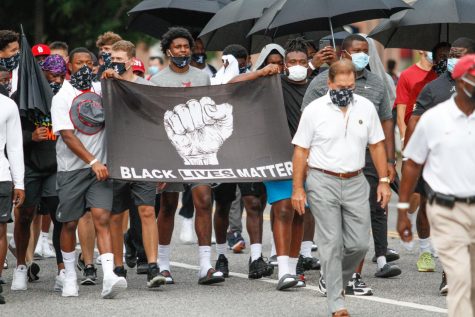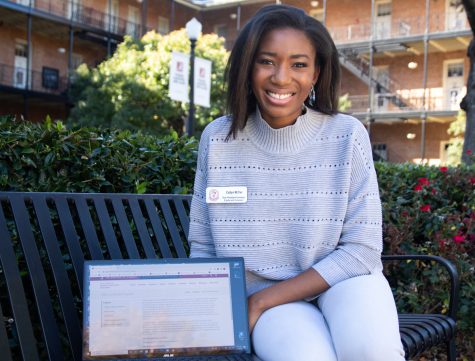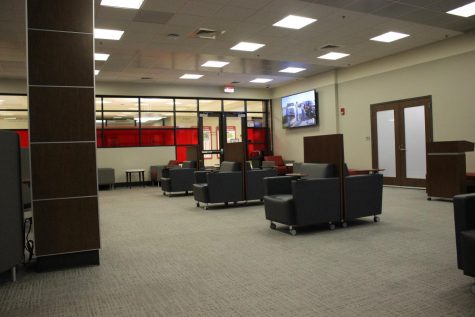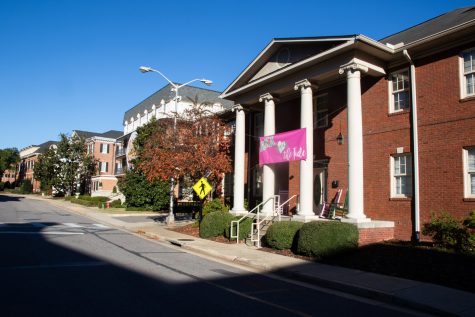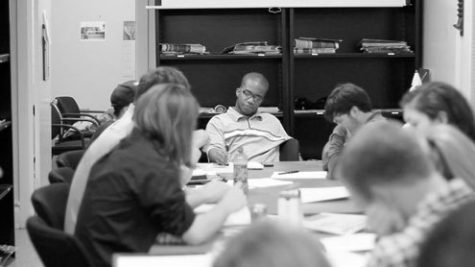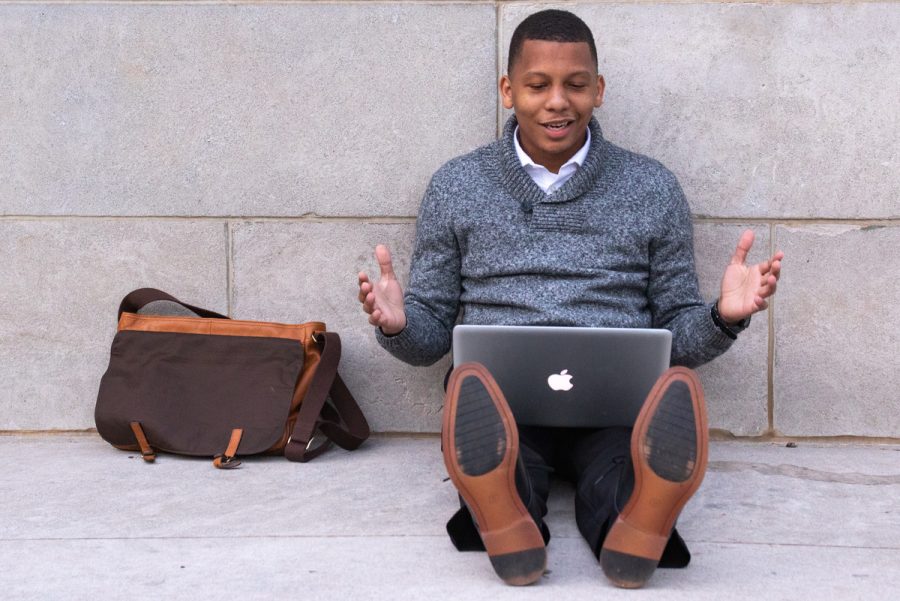Meet the student leaders building community among grad students
Even more than undergraduate students, grad students come from all walks of life and are split up amongst several colleges. These Graduate Student Union leaders are up to the challenge of bringing them all together.
Read more from the Dec. 3 1956 Collab Edition.
The University of Alabama is home to more than 5,000 graduate students who are fixtures in campus research labs and classrooms alike. Some of these students feel they lack representation and community on campus.
“There isn’t an arm of the University—academia, administration, staffing—that graduate students aren’t a part of,” said Quin Kelly, a second-year graduate student pursuing his masters in public health. “It doesn’t equate that grad students don’t have the same kind of student life on campus.”
Kelly is the president of the University’s Graduate Student Association (GSA), an organization that represents and advocates on the behalf of graduate students. But when he started his program at The University of Alabama, he wasn’t aware GSA existed. He later learned about it from graduate school staff and students.
“That was red flag No. 1,” Kelly said. “I felt that if I didn’t know about GSA, there were probably countless other graduate students who didn’t know about it.”
With prior student government experience during his years as an undergraduate student at Stillman College, Kelly felt he “couldn’t be an idle participant in graduate student needs not being met.”
Initially, he was reluctant to throw his hat into the ring for GSA president, afraid that he would be unable to make a substantive difference within GSA. But that fear didn’t stop him from running and being elected.
Since he and the rest of the GSA executive board, including Vice President Jennifer Baggett, Vice President of Communications Genoah Collins and Vice President of Student Engagement Elizabeth MacNeil took office this spring, their primary goal has been addressing the lack of graduate student representation and community.
BUILDING COMMUNITY
“What we first noticed when we got into office was that the graduate student population on campus is scattered,” Kelly said. “It’s hard to represent a collective body if there is not a community aspect of it.”
The executive board began to work on building that community, but found that doing that during a pandemic was difficult. Both GSA and the Graduate School itself made the decision to host online-only events this semester.
GSA had to forego its traditional events, such as the graduate student orientation, tailgating and town halls, and replace them with virtual-friendly programming, such as trivia nights and the Tide Together Graduate Mentor program. This program pairs new graduate students with faculty and peer mentors to help them navigate their higher education experience.
Kelly said despite social distancing guidelines taking away the physical aspect of community-building, the decision to host online-only events allowed GSA to access a wider range of students than they have before.
“The silver lining is that everyone can be included if we are online, at this point,” Kelly said. “On our quest to be inclusive on every level, this has been a good thing.”
The emphasis on online fellowship especially helped the GSA connect with those who participated in UA’s Bama By Distance program, a program that allows students to earn a baccalaureate, masters or doctorate through primarily online learning.
Due to its online component and cost of tuition, Bama By Distance is an appealing program to non-traditional students seeking graduate and postgraduate learning, such as those who are enlisted in the military or have children.
For Amy Nichols, a Tuscaloosa resident who is a wife and mother of two, Bama By Distance was her preferred route to getting her masters in communications studies and now her doctorate in education.
However, no matter how prepared she was to take her “education and career to the next level,” initially, Nichols was hesitant to continue her education because she feared school would take time away from her family.
“As a woman with traditional gender roles, I was concerned that pursuing a doctorate would be incapacitating me as a wife and mom,” Nichols said. “Because it’s a totally different basket of challenges.”
Nichols noted that for graduate students like her, who are not just students but parents too, some of these extra challenges center on balance.
“The thing to remember is [that] I can have a family, a rewarding and enriching marriage, motherhood, career and doctoral degree. I can have all of those things,” she said. “In fact, I can have all of those things at the same time maybe, but I have to choose what’s going to not be on my plate in order to pursue all of those things.”
GSA recognizes the role balance plays in the lives of grad students and seeks to leverage resources to help them as much as possible.
Nichols said GSA has connected her with other graduate students while also providing tailored support. She mentioned programs like Sitters for Service, a babysitting program for graduate students with children that was temporarily closed due to COVID-19. Kelly said programs like this were important because “aside from academically, we want the whole person to be successful.”
DEFINING COMMUNITY
Kelly said when trying to foster success for graduate students, it’s important to acknowledge that the graduate student body looks remarkably different from the undergraduate student demographic, and so do its needs.
According to college enrollment and student demographic statistics compiled by EducationData, 18.7% of graduate men and women are single parents, 5.8% are married and 4.9% work full-time.
While finding a home-work balance can be daunting, the sheer depth of financial constraints on graduate students can’t be overstated.
“We aren’t just students in the everyday capacity,” Kelly said. “We are part of the core of the University as instructors, we are in the classroom also delivering knowledge and we are the main engine for research on campus.”
Graduate students often rely on teaching or research assistantships to cover the cost of their tuition and are sometimes awarded stipends for living expenses. But Kelly said that money isn’t always adequate for the amount of work that is done and the cost of living.
“There is a huge tradeoff,” Kelly said. “We have a lot of students who are in programs that keep their [off-campus] jobs and decide to take a smaller course load.”
In an informal survey conducted by The Crimson White, around three in 10 graduate students reported having a second job. Though the majority did not, a few students said that was only because they didn’t have the time for one.
“The ratio of work to payments is [100] to [zero],” said Kayla Ballard, a graduate student in the college of education.
She said for graduate students to be financially stable, it is “absolutely” important for them to have a second job.
While full-time graduate students grapple with the pressure to secure an off-campus job to supplement their stipend, the challenge lies in juggling a full course load and an outside job without compromising educational performance.
Survey respondents echoed their dissatisfaction with the stipend rates and called for an increase in funding packages that commensurate with their value.
“The payment can definitely be increased,” one graduate student surveyed said. “After tax is removed, the amount I get is barely enough, especially now with [the] increase in rent rates.”
Graduate students have not only encountered problems with finances. Housing placement and affordability also pose an issue for some.
“A lot of [graduate students] moved to Tuscaloosa to pursue their degree, and sometimes it’s hard to find affordable housing and function with a job that allows you to pay a mortgage, rent or a lease for a condo or apartment,” Kelly said.
The GSA’s Housing Committee is committed to helping graduate students find adequate and affordable housing. Kelly said the GSA housing committee provides resources for graduate students to find housing that fit those diverse needs.
“There are people who start graduate school later in life, who are already married and they have kids,” Kelly said. “They want to find a neighborhood that is suitable for kids, married life, and that has good schools.”
Baggett, who is pursuing a doctoral degree in aerospace engineering and mechanics, directly works with the housing committee. She explained that the housing committee has been giving graduate students an outlet to communicate with each other about housing opportunities, and “giving graduate students the basis for community outreach.”
Baggett said one way that the housing committee helps graduate students find housing is through surveying and connecting graduate students to online resources, like housing-oriented social media pages and virtual property tours.
“These are opportunities for graduate students to inform other graduate students about where they’re living and what their situation is like,” Baggett said.
Kelly said he would like to see an increased effort for graduate students of all identities and walks of life included in the campus life at the University.
ANCHORING THE COMMUNITY
Kelly said while his administration continues to define the needs of the diverse graduate student population, they are attempting to take stronger approaches than in the past to ensure that the voices of graduate students are being represented within the areas of decision making at The University of Alabama.
One of those areas is the Student Government Association (SGA) where GSA has been working to exercise its voice and influence.
Over the years, Kelly said, GSA’s advocacy has failed to generate interest within the SGA, and the needs of graduate students have been overlooked due to the lack of adequate representation in the SGA.
“It’s still hard to get into rooms of decision making, because SGA is a 100-plus year old organization,” Kelly said. “We haven’t been invited to the same rooms as the SGA.”
Although graduate students are represented in the SGA, graduate students only hold six out of the 50 seats in the SGA senate.
“The problem is that it’s lopsided,” Kelly said. “It’s hard for graduate students to rely on undergraduate decision-making.”
Kelly said SGA tenure, which usually lasts one year, is incompatible with the needs of graduate students.
“A body that changes that often is not conducive to making the changes that graduate students need to succeed,” Kelly said. “It’s hard to address the needs of graduate students in a one-year term.”
Kelly said SGA and GSA are currently considering adopting an ambassadorial system that will foster communication between the two organizations.
“We are working through different ways to include graduate input with the things that we are doing so that we can communicate well about the joint needs of each student body on campus,” Kelly said.
GSA has also lobbied UA senior leadership to include graduate students on key administrative decisions. Kelly said to expand representation for graduate students on campus, GSA has added graduate student representatives to all 14 standing committees within the Office of Academic Affairs. The standing committees represent various UA offices and programs and recommend policy to university leadership.
Kelly said in the past, GSA struggled with not having GSA representatives from every academic department, but that this year, the organization has rebuilt its delegate system.
“We set out this year to have delegates from each academic department on campus,” Kelly said. “We have given a lot of ownership to each committee to explore the needs of graduate students.”
GSA’s internal committees act independently of the executive council, led by committee chairs and recommend policy changes to the way that GSA operates.
As GSA continues to expand its advocacy and form relationships with decision-makers on campus, Kelly stressed that if the University wants to continue to see an increase in graduate student recruitment numbers, people need to see a culture of health and wellness on UA’s campus. This would mean that the needs of graduate students are not only addressed, but put at the forefront of the University’s mission.
“I want to make sure that students feel welcome, and that students can say that the University is a place of comfort and home for them, because it’s a representation of who I am,” Kelly said. “At my core, I’m an advocate. When I see something that’s not right, I want to make it noticed, and make sure that it becomes a place of fairness.”



